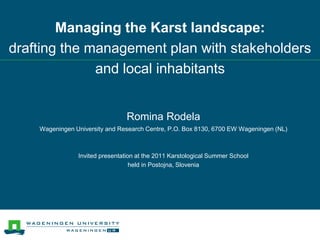Managing the Karst landscape: drafting the management plan with stakeholders and local inhabitants
- 1. Romina Rodela Wageningen University and Research Centre, P.O. Box 8130, 6700 EW Wageningen (NL) Invited presentation at the 2011 Karstological Summer School held in Postojna, Slovenia Managing the Karst landscape: drafting the management plan with stakeholders and local inhabitants
- 2. Introduction Research question: What are the “spill-over effects” of participatory approaches to natural resource management ? Research methodology: a case study; participatory approach to the drafting of a management plan / Natura 2000 sites in the Friuli Venezia Giulia region (IT) – Karst area.
- 3. Participation and nature protection 26th May 3 What are participatory approaches ? Are processes where besides the decision-maker, also the scientist and the local community is involved (stakeholders). ? Participatory decision-making e.g. park designation, management plan (output oriented) ? Participatory management e.g. community co-management, adaptive management (process oriented)
- 4. Introduction What is the NATURA 2000 ecological network? ? It is a European Community nature protection initiative, a European wide ecological network ? It aims to protect flora, fauna and its natural habitats ? Dates back to 1979 when the Member States adopted the Birds directive and in 1992 when they adopted the Habitat directive ? These two directives have changed the approach in nature protection within the European context from total protection to protection through or including human activities. 26th May 4
- 5. Participation and nature protection 26th May 2011 5 EU BIRDS DIRECTIVE HABITAT DIRECTIVE MANAGEMENT PLAN CONSERVATION MEASURES LAW ON CONSERVATION MEASURES FOR SPAs GUIDE LINE FOR MANAGEMENT PLAN FOR SACs AND SPAs ITALY REGION FRIULI VENEZIA GIULIA REGIONAL LAW ON MANAGEMENT PLAN AND CONSERVAION MEASURES FOR SACs n.7/2008 GUIDE LINE FOR MANAGEMENT PLAN (SARA MANUAL) MANAGEMENT PLAN FOR SACs AND SPAs CONSERVATION MEASURES FOR SACs
- 6. Background to the Case Special protection areas / zone di protezione speciale (Z.P.S.) , IT3341002 AREE CARSICHE DELLA VENEZIA GIULIA Special areas of conservation / siti d'importanza comunitaria (S.I.C.) , IT3340006 Carso Triestino e Goriziano
- 7. The 4 important fauna species Calimorfa quardipunctaria Proteo Osmoderma Eremita Ursus Arctos Pictures are a curtesy of: http://www.carsonatura2000.it
- 8. Habitat 8310 Caves not open to the public 3150 Natural eutrophic lakes 3140 Hard oligo- mesotrophic waters with benthic vegetation Pictures: own archive a curtesy of: http://www.carsonatura2000.it
- 9. Habitat Pictures are a curtesy of: http://www.carsonatura2000.it 1170 Reefs 7220 Petrifying springs with tufa formation 8240 Limestone pavements 8210 Calcareous rocky slopes with chasmophytic vegetation
- 10. Background to the Case Participatory process Participatory process Informative phase Participative phase Participatory workshops 1st cycle of workshops 2st cycle of workshops 3st cycle of workshops Public consultations 1st consultation 2st consultation 3st consultation 4 st consultations Etc. web- portal printed material, leaflets public forums mngt plan: 1st draft mngt plan:2st draft Participatory processParticipatory process ? public tender, ? two pases, ? local NGO (association) with 5 experienced facilitators who delivered the activities, ? from May 2009 to end September 2010. Pictures are a curtesy of: http://www.carsonatura2000.it currently under revision by a team of experts from the regional authority
- 11. Methods of data collection ? No influence over the design of participatory methods, facilitation, etc. ? Mixed- methods of data collection: ? April-May 2010: observation of workshops ? April-May 2010: ex-post questionnaire to public forums participants N= 64 ? Oct-Dec 2010: ex-post questionnaire to workshops participants N=37 ? May and July 2011: ex-post semi-structured interviews with locals
- 12. Results – questionnaire Cognitive: acquired knowledge on issue at stake- Q 4.1, Q4.2, Q 4.4 Moral: shared underst. Q 5.1, Q5.2, Q5.3, Q5.4, Q5.5; legitimacy Q9.4, position on nature protec. Q10.1,Q10.2 Relational: rapport - Q6.1,Q 6.2,Q 6.3 Trust: participants/process/moderator -Q8.1, Q8.2,Q8.3,Q8.4 ? * * * * * * * * Beyond: collaboration Q7.1,Q7.2,Q7.3, comm. interaction Q 9.1,Q9.2, Q9.3 Multidimensional variables: use of 3 to 4 variables meant to capture the multidimensionality of each aspect Cognitive Dimension Moral Dimension Relational Dimension Trust Dim.
- 13. Results questionnaire no.1 Tot_ knolwedge Tol 2 3 Stake Yes 3 28 31 No 0 3 3 missing 3 tot 3 32 37 Cognitive: Moral: 71% states that a shared agreement was reached on the issues being discussed 12% changed position on nature protection
- 14. Results: general trends Relational: 83 % agreed that workshop helped to build relationships between participants 32% started, or will, a collaboration with fellow participants 73% agreed that would call the same participants Trust: 28 % stated low trust towards fellow participants before the process 45% stated an increase in trust levels towards fellow participants
- 15. Conclusion ? Participatory processes offer valuable support to the management of natural resources. ? Participatory processes allow for sill-over effects: knowledge, relational and trust dimension. ? Participatory processes allow for an improved legitimacy of the final decision.
- 16. Thank you for your attention ! For further information: romina.rodela@wur.nl Acknowledgments: The research reporter here is funded under the MCActions-PEOPLE-FP7(project titled Social Learning Processes in Natural Resource Management: the Role of Learning, Negotiation and Social Capital for more Sustainable Natural Resource Management). The research presented is done in collaboration with dr. Elena Maiulini from the University of Udine.
















